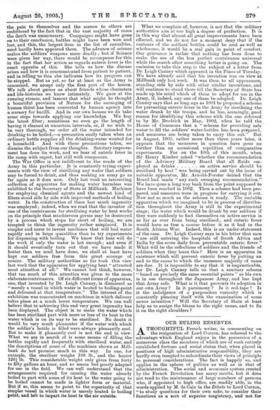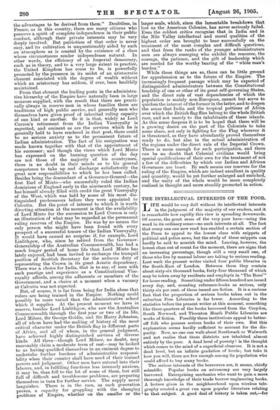OUR RULING RESERVES. the advantages to be derived from them."
Doubtless, in France, as in this country, there are many citizens who preserve a spirit of complete independence in their public conduct, although their private interests may be very deeply involved. But patriotism of that order is never easy, and its cultivation is unquestionably aided by such an atmosphere as is created by the existence of a class whose circumstances render independence natural. In other words, the efficiency of an Imperial democracy, such as in theory, and to a very large extent in practice, the United Kingdom has come to be, is powerfully promoted by the presence in its midst of an aristocratic element associated with the degree of wealth without which an aristocracy has seldom, if ever, been healthily maintained.
From that element the leading posts in the administra- tive hierarchy of the Empire have naturally been in large measure supplied, with the result that there are practi- cally always in reserve men in whose families there are traditions of high public service, and, generally men who themselves have given proof of inherited ruling capacity of one kind or another. So it is that, widely as Lord Curzon's retirement from the Indian Viceroyalty is regretted, and eminent as are the services which he is generally held to have rendered in that post, there could be no serious anxiety as to the permanent future of Indian administration. The fact of his resignation was made known together with that of the appointment of his successor; and though the views which Lord Minto has expressed on the burning question of the day are not those of the majority of his countrymen, there is no doubt in their minds as to his general competence to take up and discharge satisfactorily the great new responsibilities to which he has been called. Besides being the descendant of a Governor-General—the first Earl of Minto—who successfully ruled the Indian dominions of England early in the nineteenth century, he has himself already filled with credit the great Viceroyalty of the West, which was held by some of his most dis- tinguished predecessors before they were appointed to Calcutta. But the point of interest to which it is worth directing attention at the moment is that the availability of Lord Minto for the succession to Lord Curzon is only an illustration of what may be regarded as the permanent ruling reserves of the Empire. He was by no means the only person who might have been found with every prospect of a successful tenure of the Indian Viceroyalty. It would have caused no surprise if, for example, Lord Linlithgow, who, since he retired from the Governor- Generalship of the Australian Commonwealth, has had a much longer period of home life than Lord Minto has lately enjoyed, had been invited to exchange the tranquil position of Scottish Secretary for the arduous duty of representing the Crown in its great Asiatic dependency. There was a choice for India, that is to say, of men with such prestige and experience as a Constitutional Vice- royalty affords, among the adherents or members of the Government, and a choice at a moment when a vacancy at Calcutta was not expected. But, of course, it is far from being for India alone that rulers are being trained in the Empire. Nothing could possibly be more varied than the administrative school which it supplies. At the present moment we have in reserve, besides Lord Linlithgow, who saw the Australian Commonwealth through the first year or two of its life, Lord Milner, Sir George Goldie, and Sir Harry Johnston, all of whom have had the making of history of the most critical character under the British flag in different parts of Africa, and all of whom, in the general judgment, have achieved highly distinguished services of diverse kinds. All three—though Lord Milner, no doubt, may reasonably claim a moderate term of rest—may be looked to as having qualified themselves in an eminent degree to undertake further burdens of administrative responsi- bility when their country shall have need of their trained powers and judgment. Other men have entered into their labours, and, in fulfilling functions less intensely anxious, it may be, than fell to the lot of some of them, but still full of difficult and troublesome problems, are preparing themselves in turn for further service. The supply never languishes. There is in the race, as each generation proves, a capacity for grappling with the changing problems of Empire, whether on the smaller or the larger scale, which, since the lamentable breakdown that lost us the American Colonies, has never seriously failed. Even the coldest critics recognise that in India and in the Nile Valley intellectual and moral qualities of the highest order are brought to bear successfully on the treatment of the most complex and difficult questions, and that from the ranks of the younger administrators men are always emerging who exhibit the resource, the courage, the patience, and the gift of leadership which are needed for the worthy bearing of the "white man's burden."
While these things are so, there can be little ground for apprehension as to the future of the Empire. The increasingly frequent passage which may be expected of distinguished administrators between the Constitutional headship of one or other of its great self-governing States, and the direct rule of vast dependencies of which the population is mainly non-European, cannot but serve to quicken the interest of the former in the latter, and to deepen the sense that India and the tropical poitions of Africa over which the British flag flies belong to the whole British race, and not merely to the inhabitants of these islands. As this sense deepens it is to be hoped that there will be a growing desire on the part of the Colonists to take some share, not only in fighting for the Flag wherever it is threatened, as they have abundantly proved themselves ready to do, but also in the actual administration of the regions under the direct rule of the Imperial Crown. There is room enough for such participation, and there can be no •doubt that Colonial civilians would bring special qualifications of their own for the treatment of not a few of the difficulties by which our Indian and African Governors are beset. By such means our reserves for the ruling of the Empire, which are indeed excellent in quality and quantity, would be yet further enlarged and enriched, and the unity of the whole would be more completely realised in thought and more steadily promoted in action.



































 Previous page
Previous page